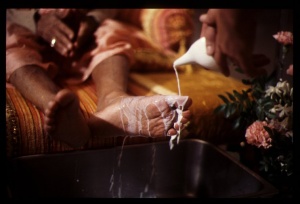CC Madhya 7.126 (1975): Difference between revisions
(Vanibot #0027: CCMirror - Mirror CC's 1996 edition to form a basis for 1975) |
(Vanibot #0020: VersionCompareLinker - added a link to the Version Compare feature) |
||
| Line 2: | Line 2: | ||
<div style="float:left">'''[[Sri Caitanya-caritamrta (1975)|Śrī Caitanya-caritāmṛta (1975)]] - [[CC Madhya (1975)|Madhya-līlā]] - [[CC Madhya 7 (1975)|Chapter 7: The Lord Begins His Tour of South India]]'''</div> | <div style="float:left">'''[[Sri Caitanya-caritamrta (1975)|Śrī Caitanya-caritāmṛta (1975)]] - [[CC Madhya (1975)|Madhya-līlā]] - [[CC Madhya 7 (1975)|Chapter 7: The Lord Begins His Tour of South India]]'''</div> | ||
<div style="float:right">[[File:Go-previous.png|link=CC Madhya 7.125 (1975)|Madhya-līlā 7.125]] '''[[CC Madhya 7.125 (1975)|Madhya-līlā 7.125]] - [[CC Madhya 7.127 (1975)|Madhya-līlā 7.127]]''' [[File:Go-next.png|link=CC Madhya 7.127 (1975)|Madhya-līlā 7.127]]</div> | <div style="float:right">[[File:Go-previous.png|link=CC Madhya 7.125 (1975)|Madhya-līlā 7.125]] '''[[CC Madhya 7.125 (1975)|Madhya-līlā 7.125]] - [[CC Madhya 7.127 (1975)|Madhya-līlā 7.127]]''' [[File:Go-next.png|link=CC Madhya 7.127 (1975)|Madhya-līlā 7.127]]</div> | ||
{{CompareVersions|CC|Madhya 7.126|CC 1975|CC 1996}} | |||
{{RandomImage}} | {{RandomImage}} | ||
==== TEXT 126 ==== | ==== TEXT 126 ==== | ||
| Line 11: | Line 10: | ||
<div class="verse"> | <div class="verse"> | ||
:kṛpā kara, prabhu, more, yāṅ tomā-saṅge | :kṛpā kara, prabhu, more, yāṅ tomā-saṅge | ||
:sahite nā pāri duḥkha viṣaya- | :sahite nā pāri duḥkha viṣaya-taraṅge' | ||
</div> | </div> | ||
| Line 25: | Line 24: | ||
<div class="translation"> | <div class="translation"> | ||
The brāhmaṇa begged Lord Caitanya Mahāprabhu, | The brāhmaṇa begged Lord Caitanya Mahāprabhu, "My dear Lord, kindly show me favor and let me go with You. I can no longer tolerate the waves of misery caused by materialistic life." | ||
</div> | </div> | ||
| Line 32: | Line 31: | ||
<div class="purport"> | <div class="purport"> | ||
This statement is applicable for everyone, regardless of how rich or prosperous one may be. Narottama dāsa Ṭhākura has confirmed this statement: saṁsāra-viṣānale, divā-niśi hiyā jvale. He states that the materialistic way of life causes a burning in the heart. One cannot make any provisions for the troublesome life of the material world. It is a fact that one may be very happy as far as riches are concerned and one may be very opulent in every respect, yet one has to manage the viṣayas to meet the demands of the body and of so many family members and subordinates. One has to take so much trouble to minister to others. Narottama dāsa Ṭhākura therefore prays: viṣaya chāḍiyā kabe śuddha | This statement is applicable for everyone, regardless of how rich or prosperous one may be. Narottama dāsa Ṭhākura has confirmed this statement: saṁsāra-viṣānale, divā-niśi hiyā jvale. He states that the materialistic way of life causes a burning in the heart. One cannot make any provisions for the troublesome life of the material world. It is a fact that one may be very happy as far as riches are concerned and one may be very opulent in every respect, yet one has to manage the viṣayas to meet the demands of the body and of so many family members and subordinates. One has to take so much trouble to minister to others. Narottama dāsa Ṭhākura therefore prays: viṣaya chāḍiyā kabe śuddha habe mana. Thus one must become freed from the materialistic way of life. One has to merge himself in the ocean of transcendental bliss. In other words, one cannot relish transcendental bliss without being freed from the materialistic way of life. It appears that the brāhmaṇa named Kūrma was materially very happy, for he expressed his family tradition as janma-kula-dhana. Now, being glorious, he wanted to leave all these material opulences. He wanted to travel with Śrī Caitanya Mahāprabhu. According to the Vedic way of civilization, one should leave his family after attaining fifty years of age and go to the forest of Vṛndāvana to devote the rest of his life to the service of the Lord. | ||
</div> | </div> | ||
Latest revision as of 19:17, 27 January 2020

A.C. Bhaktivedanta Swami Prabhupada
TEXT 126
- kṛpā kara, prabhu, more, yāṅ tomā-saṅge
- sahite nā pāri duḥkha viṣaya-taraṅge'
SYNONYMS
kṛpā kara—kindly show favor; prabhu—O my Lord; more—unto me; yāṅ—I go; tomā-saṅge—with You; sahite nā pāri—I cannot tolerate; duḥkha—the troubles; viṣaya-taraṅge—in the waves of materialistic life.
TRANSLATION
The brāhmaṇa begged Lord Caitanya Mahāprabhu, "My dear Lord, kindly show me favor and let me go with You. I can no longer tolerate the waves of misery caused by materialistic life."
PURPORT
This statement is applicable for everyone, regardless of how rich or prosperous one may be. Narottama dāsa Ṭhākura has confirmed this statement: saṁsāra-viṣānale, divā-niśi hiyā jvale. He states that the materialistic way of life causes a burning in the heart. One cannot make any provisions for the troublesome life of the material world. It is a fact that one may be very happy as far as riches are concerned and one may be very opulent in every respect, yet one has to manage the viṣayas to meet the demands of the body and of so many family members and subordinates. One has to take so much trouble to minister to others. Narottama dāsa Ṭhākura therefore prays: viṣaya chāḍiyā kabe śuddha habe mana. Thus one must become freed from the materialistic way of life. One has to merge himself in the ocean of transcendental bliss. In other words, one cannot relish transcendental bliss without being freed from the materialistic way of life. It appears that the brāhmaṇa named Kūrma was materially very happy, for he expressed his family tradition as janma-kula-dhana. Now, being glorious, he wanted to leave all these material opulences. He wanted to travel with Śrī Caitanya Mahāprabhu. According to the Vedic way of civilization, one should leave his family after attaining fifty years of age and go to the forest of Vṛndāvana to devote the rest of his life to the service of the Lord.